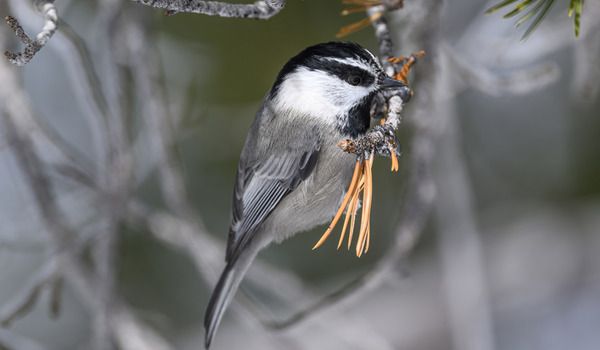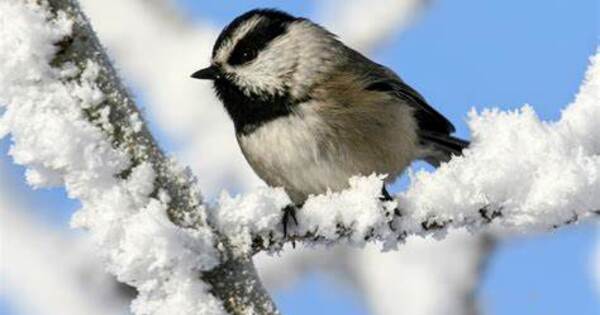Mountain chickadees have some of the strongest spatial memories in the animal kingdom. New research reveals the genes involved and sheds light on how a changing climate may influence the evolution of this particular skill.
Have you lost your keys? Can’t remember where you parked your car? Wish you had the memory of a mountain chickadee. These half-ounce birds, with brains slightly larger than a pea, hide tens of thousands of food items such as seeds under tree bark, under dead leaves, and within pinecones throughout the highlands. When winter hits, they can recall the exact locations of their caches, which helps them survive the harsh weather and dense snow.
In a new study published in the journal Current Biology, researchers at the University of Colorado Boulder and the University of Nevada, Reno identify nearly a hundred genes associated with the birds’ spatial memory, or ability to recall the locations of objects. The paper also suggests a potential trade-off may exist between having a solid long-term memory and being able to quickly ditch old memories to form new ones.
The findings could help biologists better understand the evolution of spatial memory in animals, including humans.
Understanding the genetic basis of this trait will allow us to understand how the trait evolves. They live in a milder environment where food is generally available year-round.
Scott Taylor
“Chickadees are impressive birds,” said Scott Taylor, the director of CU Boulder’s Mountain Research Station and associate professor in the Department of Ecology and Evolutionary Biology. “They can remember tens of thousands of locations where they cached food across an entire winter and a new set of those the next winter. Their spatial memory is much more developed than many other birds that don’t have to have this strategy to survive cold winters.”
Taylor and his associates at the University of Nevada, Reno, lead by biologist professor Vladimir Pravosudov, devised a novel technique to assess the spatial memory of wild mountain chickadees. They hung various feeder arrays in California’s Sierra Nevada mountains, each with eight seed-filled bird feeders. Each feeder has a gate equipped with a radio frequency reader capable of detecting a tag placed on chickadees by researchers. The scientists then configured each gate to only open to specific birds, forcing the chickadees to remember which feeders would open to them.
Pravosudov and his team then counted how many times each chickadee landed on the wrong feeders before they recalled the right one. The theory is that birds with better spatial memory would have a lower error rate.

Using blood samples, the CU Boulder team sequenced the whole genome of 162 tagged chickadees, resulting in the largest dataset ever collected for examining the genetic basis of chickadee cognitive ability. The team discovered 97 genes involved in chickadee spatial learning and memory by comparing the birds’ genomes to their performance on the feeder test. Birds with certain genetic variants at these genes made fewer unsuccessful attempts to land on their chosen feeders.
According to research co-author Sara Padula, a Ph.D. student in the Department of Ecology and Evolutionary Biology, a high number of these polymorphisms are linked to neuron development in the hippocampus, a brain region crucial for learning and memory.
“Understanding the genetic basis of this trait will allow us to understand how the trait evolves,” Taylor said. Taylor notes that the common ancestor of all North American chickadees cached food. But of the seven species of chickadees now found here, two do not.
“They live in a milder environment where food is generally available year-round. Now that we know the gene regions that underlie spatial memory, we can look at what variation looks like in these species that have lost caching,” he said.
‘This study substantially advanced our understanding of the genetics of spatial memory in birds and behavioral genetics more broadly,” said Georgy Semenov, the paper’s co-author and a research associate in the Department of Ecology and Evolutionary Biology.
A trade-off
Chickadees that have exceptional spatial memory can live up to nine years, which is a long time for a small bird, Taylor said. But the study suggests that having good long-term memory may come at a price.
After completing the initial assignment for a few days, Pravosudov’s team distributed additional feeders to the birds. To the team’s astonishment, chickadees that performed well in the initial test struggled to adjust to the new feeder. They appeared to struggle more with letting go of old memories and making new ones.
“In a more varied environment, our collaborators discovered that chickadees with high long-term memory may be at a disadvantage. For example, if there is an unexpected snowstorm, these birds may continue to try to visit caches that have become buried in the snow, rather than forgetting them and searching for other caches,” Padula explained.
A shifting climate
In a rapidly changing climate, birds that can quickly create new memories may fare better.
“Because of climate change, we might expect these selective pressures that have been shaping chickadee’s special memory for thousands of years to shift significantly,” Taylor went on to say.
This winter, Taylor and his crew installed a similar feeder array at the university’s Mountain Research Station, located west of Boulder. For the past million years, mountain chickadees in the Rocky Mountains have evolved independently of those in the Sierra Nevada Mountains. The researchers want to see if the two groups of birds evolved spatial memory in the same way across various geographic regions.
The team also wants to know if black-capped chickadees, which live with mountain chickadees in the Rocky Mountains, have different spatial memory skills. They will continue the feeder experiment at the Mountain Research Station over the next few seasons to acquire additional data.
“We don’t need to fly to a remote corner of the planet like Antarctica to investigate how animals may react to climate change. We can accomplish it with these birds, which most North Americans are familiar with. Taylor added, “I believe there is something special about chickadees.”
















